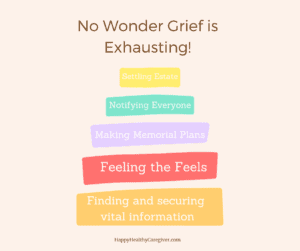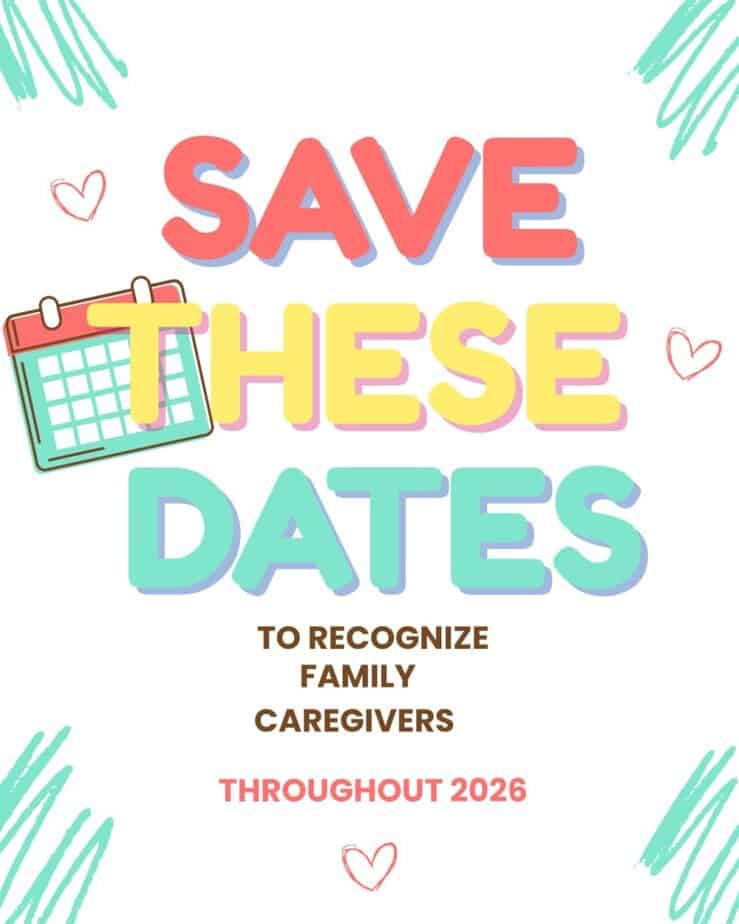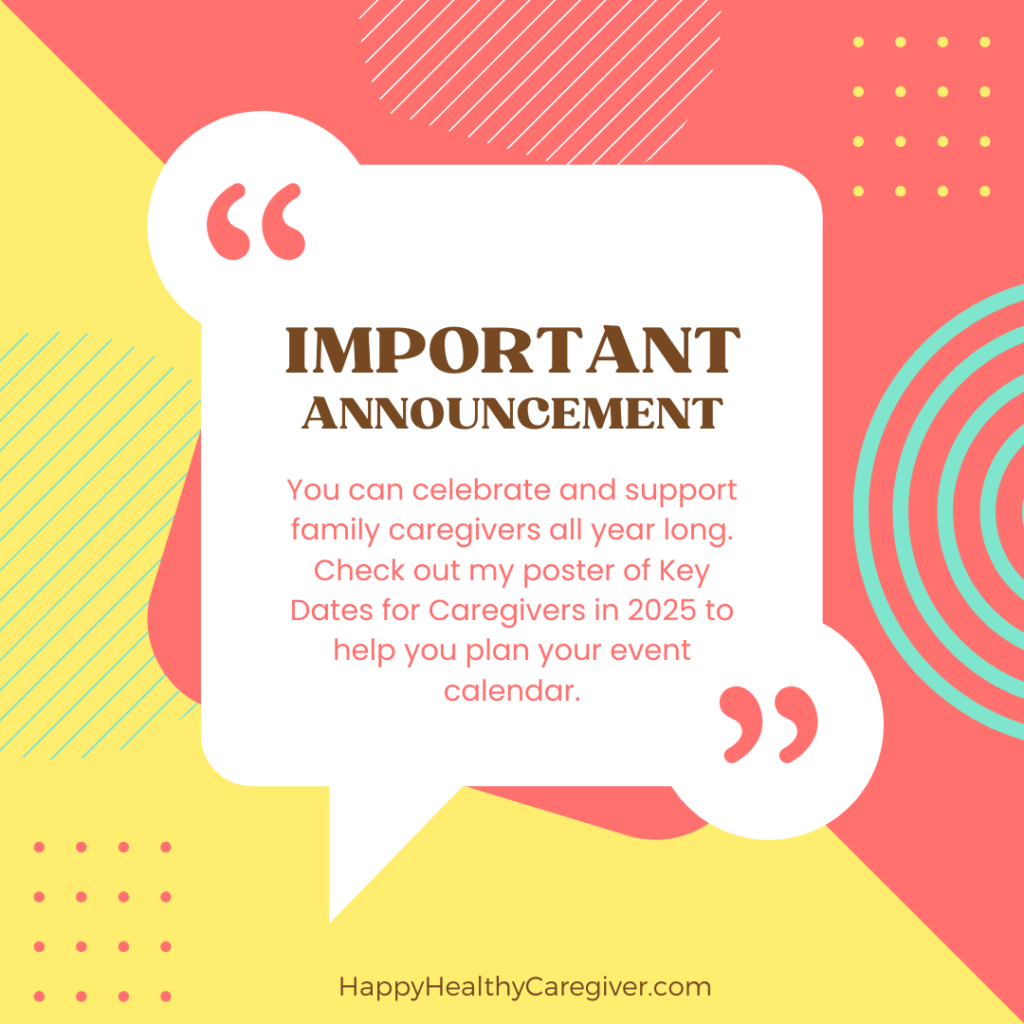When my Dad died in the summer of 2014, I wished the world would stop spinning so I could catch my breath. While my Dad’s final hospitalization and decline, followed by hospice, was sudden in our eyes, the emotional rollercoaster of caregiving started months prior. In Spring 2014, my mom was intubated due to COPD-related respiratory complications. We believed she was going to die. Her recovery involved a long hospitalization and intense rehab. Even after she came home, her health and mobility never returned to how she was before her hospitalization.
My siblings and I had taken turns getting our home lives and careers situated so we could help first with Mom and then with Dad. We thought Dad would recover from his hospitalization as he was always the stronger of my parents. Now as a caregiving coach, I see it all the time; the caregiver burnout of the healthier primary caregiver takes a toll and sometimes leads to death or worsens the caregiving situation for a family.
During the last week of Dad’s life, I left a work conference early, rented a car, and headed to the hospice community, where he was placed after his decision not to be intubated anymore. We were all there and had a grand celebration of his life.
When we weren’t boots on the ground in Florida supporting our parents that year, we were researching and visiting senior living options in Georgia and making plans for my brother Tom. Tom was born with an intellectual and developmental disability and lived with my parents in 2014.
When my Dad passed, we were already emotionally and physically exhausted. Little did we know the sheer volume of cascading and complex tasks in store for us. We were also in crisis mode. My mom and brother, who both required care, could not live six hours away from family.
My siblings and I felt so overwhelmed by the massive onslaught of to-dos we couldn’t properly grieve the loss of our Dad. A few initial daunting tasks were: selecting the right assisted living community for Mom, finalizing details for Tom to move in with my brother Tim, listing my parent’s dream home condo, packing up their entire home, and handling all the post-death tasks for Dad.
Post-death tasks don’t get easier after living through them once, but at least you know what to expect and can anticipate ways to divide and conquer. Some of these can even be done in advance to reduce the decisions you must make during an emotionally and physically exhausting time.
I’m likely missing some of the responsibilities in my checklist below. Use this as a starting list of tasks that can be considered for your situation.

Vital Information to Gather Before Someone Dies
Sadly, there is much business to take care of after someone dies. The following information will typically be required for a burial permit which grants permission for a burial to take place:
- Legal name, home address, telephone number
- When did they move to this state (so you can infer the number of years in the state)
- Business name or Employer name, address, telephone number (care recipient’s occupation, title, and manager)
- Military details such as service date, service place, service number, separation from service information, grade/rank/rating, and branch of service
- Place of Birth and if a U.S. Citizen or not
- Mother and Father’s Names (including maiden name) and birthplace
- Religion (if applicable)
The documents below (if applicable) will be requested by various parties to establish your rights to insurance, pension, social security, ownership, etc.
- Will and Certificate of Trust
- Birth certificate or legal proof of age
- Social Security Card or number
- Marriage license
- Citizenship papers
- Insurance policies (life, health, and accident, property)
- Pension plan
- Bank and financial account information
- Property deeds
- Bill of sale of car or title
- Income tax returns, receipts, or bank statements
- Veterans discharge certificate
- Disability claims
- Deed to burial property and funeral prearrangements (if purchased in advance)
A courageous conversation about your care recipient’s personal preferences and wishes before a crisis will allow you to be present during grief and loss and reduce decision-making friction among family members. There are a few resources that can help facilitate these conversations, including the Five Wishes Advance Directive and The Conversation Project.
- Burial/cremation, funeral home, and memorial wishes (service type, readings, media publications for notification, favorite songs, clothing/jewelry to wear, etc.)
- List of valued charities for potential donations instead of flowers
- Organ donation wishes
- List of names and phone numbers of their friends and family they would want you to notify
- Make a shared digital album of favorite photos for people to add to for a slideshow, announcements, or to display at the memorial.
- Identify a grief counselor or support group available for surviving friends and family.
After my aunt passed, we were surprised to learn that my cousin’s Financial Power of Attorney was no longer applicable after her mom’s death. Death can be expensive. According to the National Funeral Directors Association (NFDA), the median cost of a funeral with viewing and burial in the U.S. was around $7,640 in 2019. Prices will vary depending on choices being made and location. Cremation is generally a more affordable option than traditional burial services. In addition, legal and administrative expenses are associated with settling the deceased’s affairs, such as obtaining death certificates, probate fees, legal representation, obituary announcements, and other memorial plans.
Tasks that May be Required After a Death
Many hands make light work. One person doesn’t have to own all of these responsibilities. However, a designed trustee will sometimes need to perform some of these duties.
Tasks to be done Immediately
The following tasks are recommended to be done immediately after someone passes or at least within the first few days:
- If death occurs at home, notify emergency authorities, primary doctor, or home hospice. Document the date and cause of death.
- Notify immediate family, best friends, and current employer or military unit
- Contact the funeral home or faith community to guide you through preparing for the funeral or memorial service, obtaining necessary permits, and handling the transportation and disposition of the body.
- Order 10-20 Copies of the Death Certificate – an original copy is often required for most financial and administrative processes following a death. Your attorney and or financial planner can help you determine ne how many copies may be needed for your situation. Better to order more than you think you’ll need.
- Secure any valuables such as jewelry, silver, and essential heirlooms to mitigate potential loss or misuse
- Make immediate plans to care for children and pets.
Tasks for the Weeks Following a Death
While it is crucial to act promptly, the grieving process adheres to no timeline. The following tasks can typically wait until week 2 to start.
- Redirect your loved one’s mail and assign a neighbor to keep a watchful eye on the empty home
- Secure memorial clothing
- Notify extended friends and family and friends of specific memorial plans. You may want to include a social post on your care recipient’s account to reach their friends quickly.
- Notify financial institutions, credit bureaus, and insurance companies
- Address Legal and Estate Matters – an attorney or estate planner to navigate legal matters such as probate, distribution of assets, and executing the deceased’s will or trust. They can guide you through the legal steps to ensure a smooth ownership transition and settle any outstanding debts or obligations.
- Notify Government Agencies (e.g., Veterans Affairs) and Social Security Administration
- Pay outstanding bills and cancel or transfer subscriptions and memberships
- Additional memorial plans such as writing eulogy/obituary, identifying hotels for out-of-town visitors, selecting readers/pallbearers
- Remove plants, perishable food, and trash from the care recipient’s home
- Access your care recipient’s social media accounts, email accounts, and online storage. It’s essential to gain access to these accounts to manage or memorialize them according to your loved one’s wishes. Some platforms have specific procedures for handling charges of deceased individuals, so it’s worth checking their respective policies.
Tasks for the Months Following A Death
- List property for sale.
- Follow up with the deceased’s employer to inquire about 401(k), pension, or other company benefits.
- Notify the registrar of voters
- Contact the Department of Motor Vehicles to cancel the deceased’s driver’s license and transfer titles of registered vehicles
- Clean out/donate personal belongings and medical equipment
- Collect personal belongings in public places. Suppose your loved one had personal belongings stored in public places such as gym lockers, storage units, galleries, or rented spaces. In that case, retrieving those items and terminating any associated contracts or agreements is essential.
- Scan photos if multiple family members want originals.
- Write thank you notes.
- Advise all creditors in writing of their client’s recent passing
- Update your beneficiaries and legal/financial documents.
properly. Remove personal information from the containers and check if your local law enforcement agency or participates in drug take-back programs.
I’ll update this article as I recall and become familiar with more things I may have missed.
Resources to Help the Grieving Family Caregiver
As a grieving family caregiver (or one anticipating grief), I want to share a few resources that may help you during the transitioning and end-of-life phases of your caregiving journey.
Happy Healthy Caregiver podcast episodes
- My story of grief and resilience after the loss of my mom
- Usha Tewari shares what helped her with caregiver and grief burnout after the loss of her mom
- My sister Susie shares about adjusting to life after caregiving ends
- Beth Marshall offers hope and healing during the grieving process
- Cassidy Bastien discusses the Death Positive Movement
- Barbara Karnes shares everything you want to know about hospice
If you are a reader or journaler, consider adding these to your to-be-read pile:
I wish I could press pause on the world to allow you to catch your breath and just be. If you’d like to talk to someone, please take advantage of scheduling a complimentary coaching session with me. We can do hard things, but we don’t have to do them alone.








